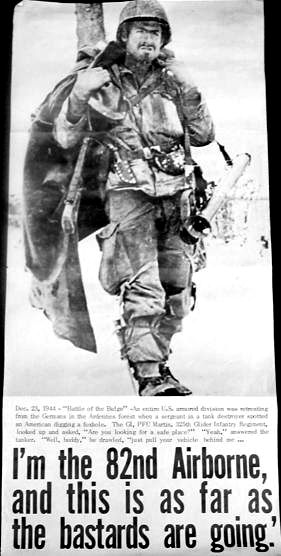 Some tough folks back in the day
Some tough folks back in the dayHe also issued a memorable statement to the Germans. https://www.youtube.com/watch?v=W8mb3O5u6ig
 Some tough folks back in the day
Some tough folks back in the dayDoing war at Christmas is supposed to be some kind of surprise.
It’s happened so often, it isn’t a surprise at all. It’s when I would expect something to happen.
The version I'd read goes something like this: the German commander was given the reply, "Nuts", and asked the translator, does he want to give us food or something, I don't understand. "No, sir, he's telling you to go to Hell."
The movie version of Patton has him receiving word of the exchange on the road to Bastogne. Not sure it happened quite that way, but Patton had sent word to the Bastogne commander that they'd share a Christmas toast.
The 3rd Army didn't break through on Christmas Day, although some elements managed to locate a way in very early on the 26th. Bastogne had full continuity with the rest of the Allied forces on the 27th.
The German offensive was something like 26 divisions (none of them at full strength or fully equipped -- but still, 26 divisions, with experienced troops and leaders in their tnaks) seemingly conjured up out of thin air. The European road system was still often old, medieval lanes and such, and to make rapid movements in force, the Germans needed to use their best roads, which converged in larger towns (like Bastogne).
Stopping their offensive dead was the US practice of tying up major crossroads until reinforcements arrived. Sometimes it was engineering battalions whose normal jobs were finding and building bridges and repairing cratered roads and so on -- they were put to work destroying every bridge, blowing and blocking roads, and engaging in what we'd now call asymmetrical warfare.
Not long ago I ran through an audiobook about 3rd Army and the Bulge/Bastogne, and picked up an interesting thing I'd not heard or considered before -- the US use of handheld radios in all WWII theaters gave US infantry a huge advantage in both field intel and coordinating movements. Also, during the fighting around Bastogne, US forces encountered Sherman tanks that had been captured / repaired and painted up by the Germans, that was of help to them since they were running out of armor.
When McAuliffe read the German offer of surrender he didn’t know quite how to answer. One of his staff told him to just say what he usually said when something went sideways so he wrote down the now famous reply “Nuts.”